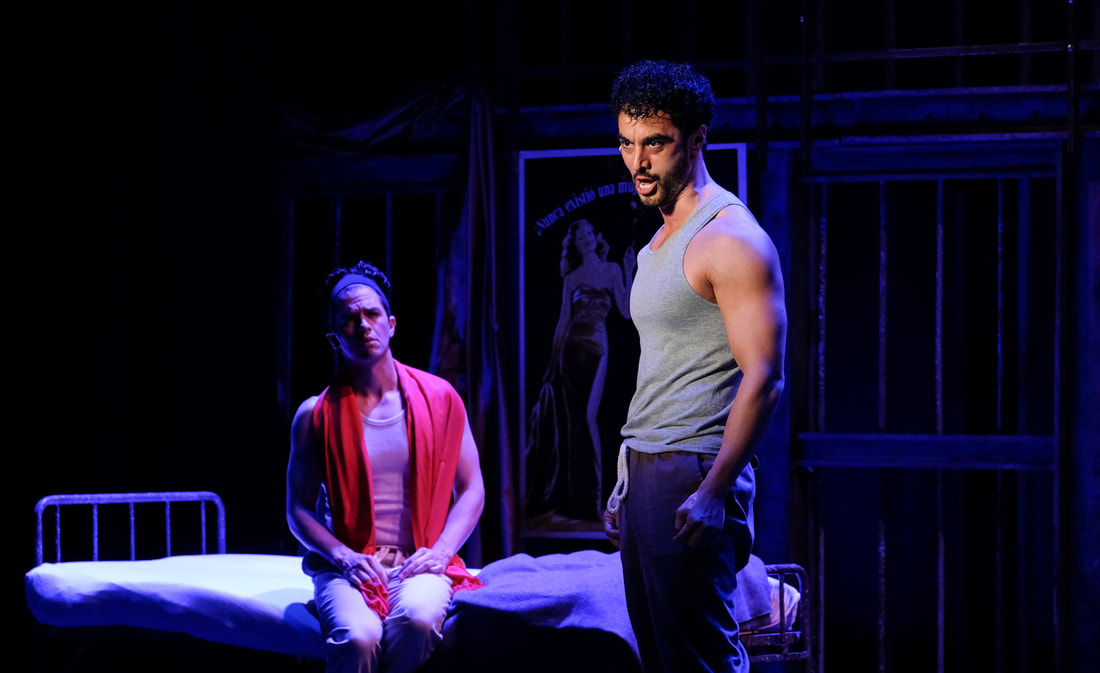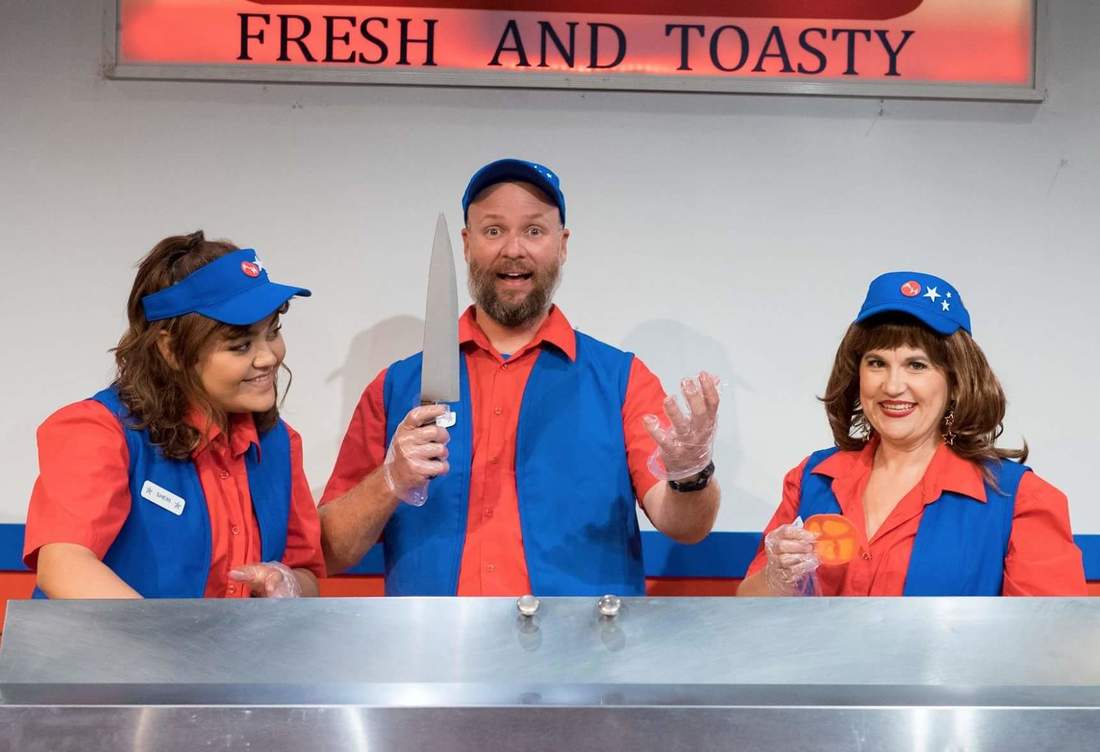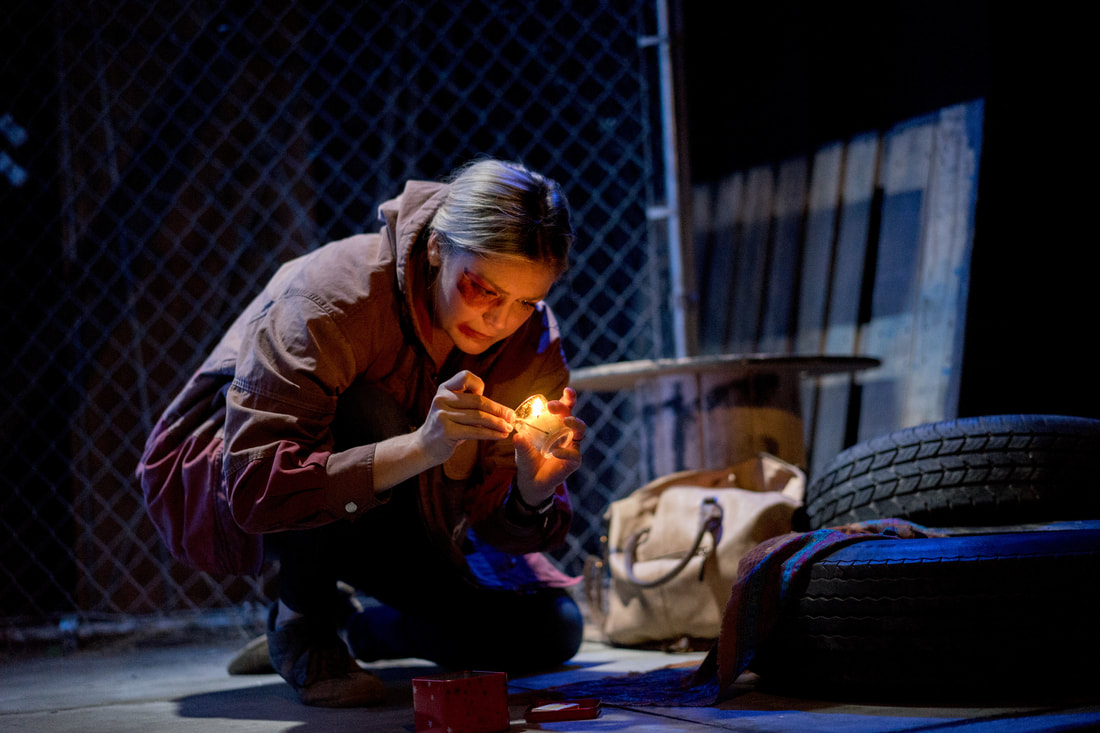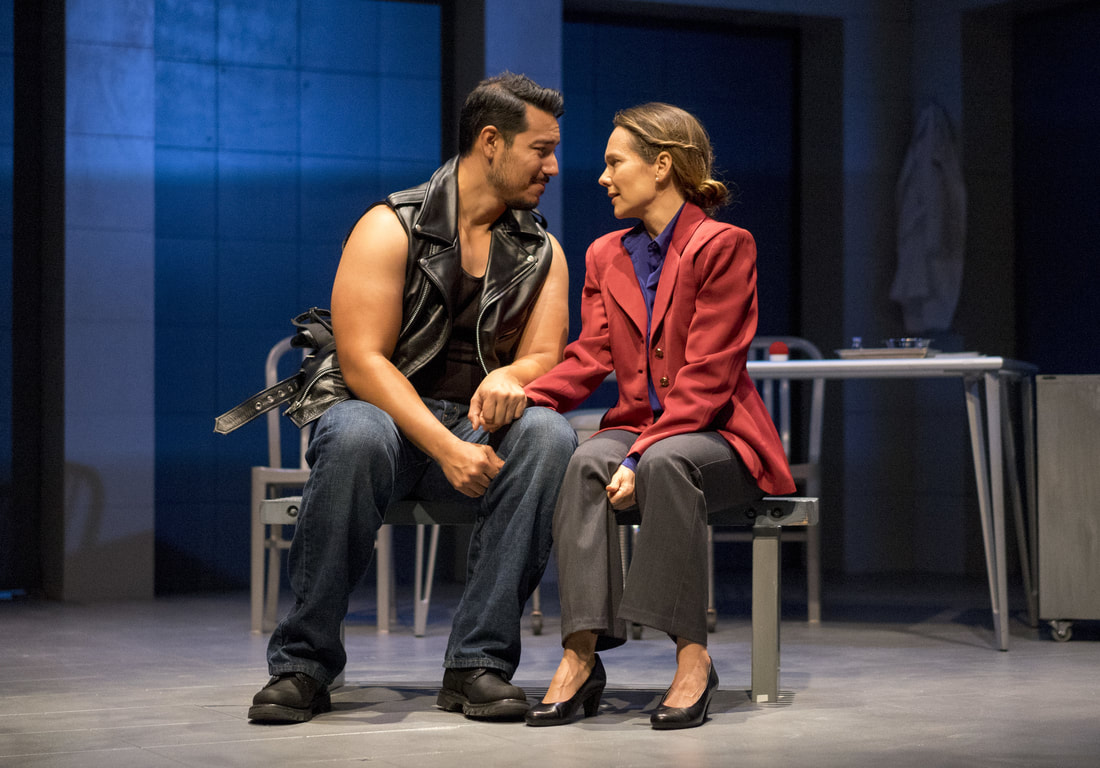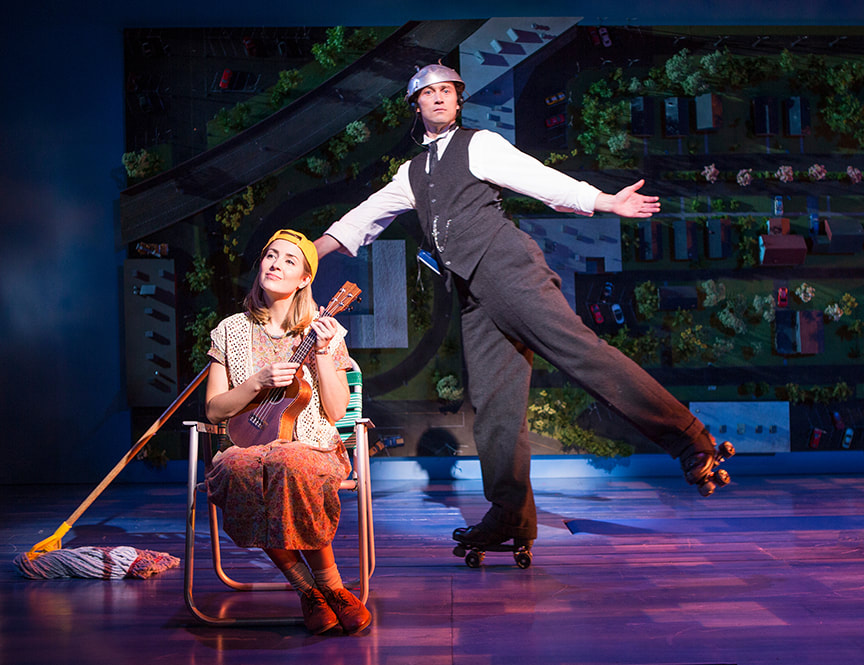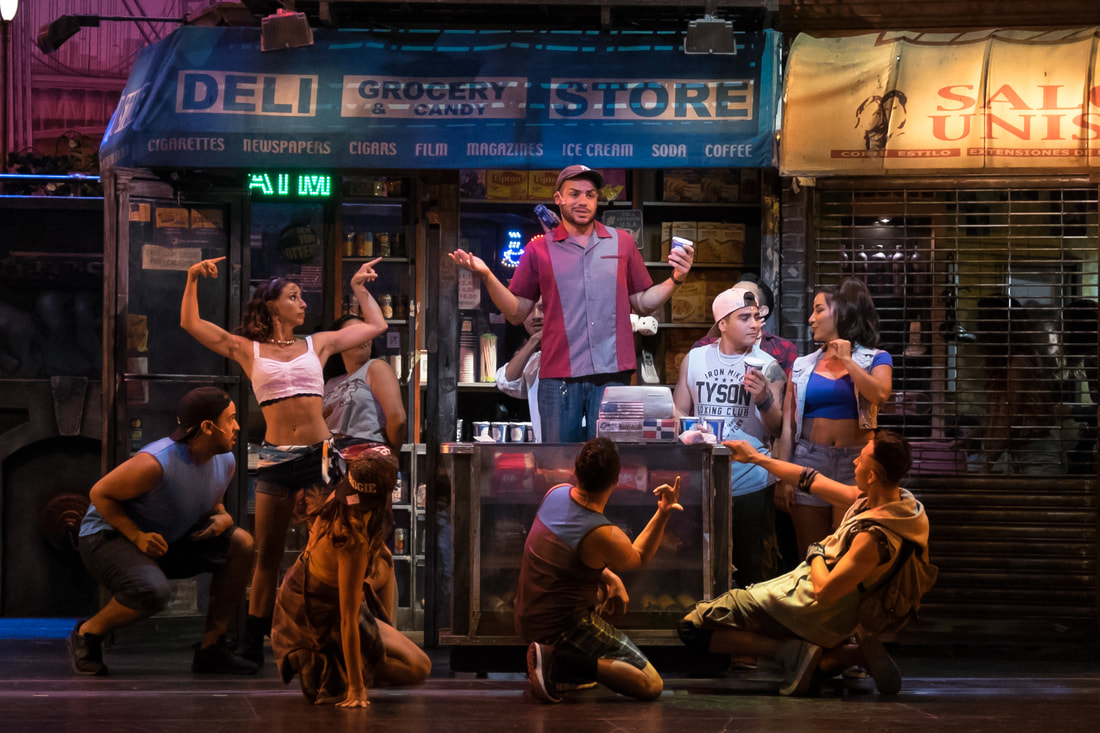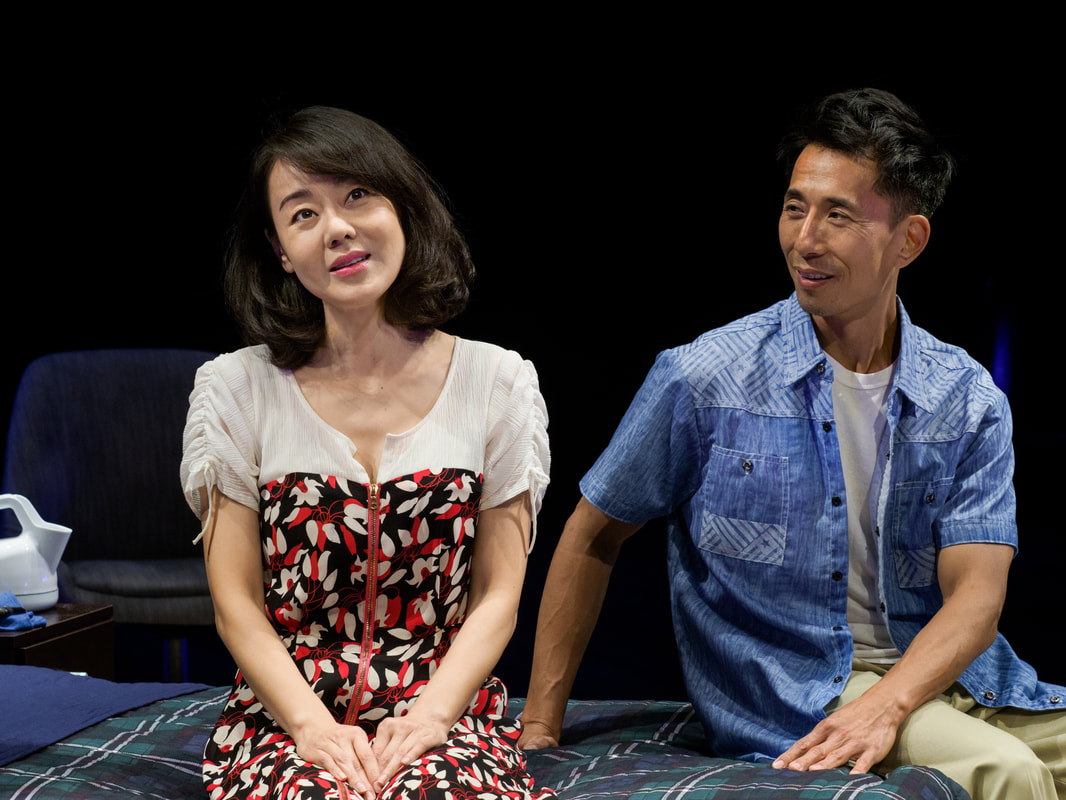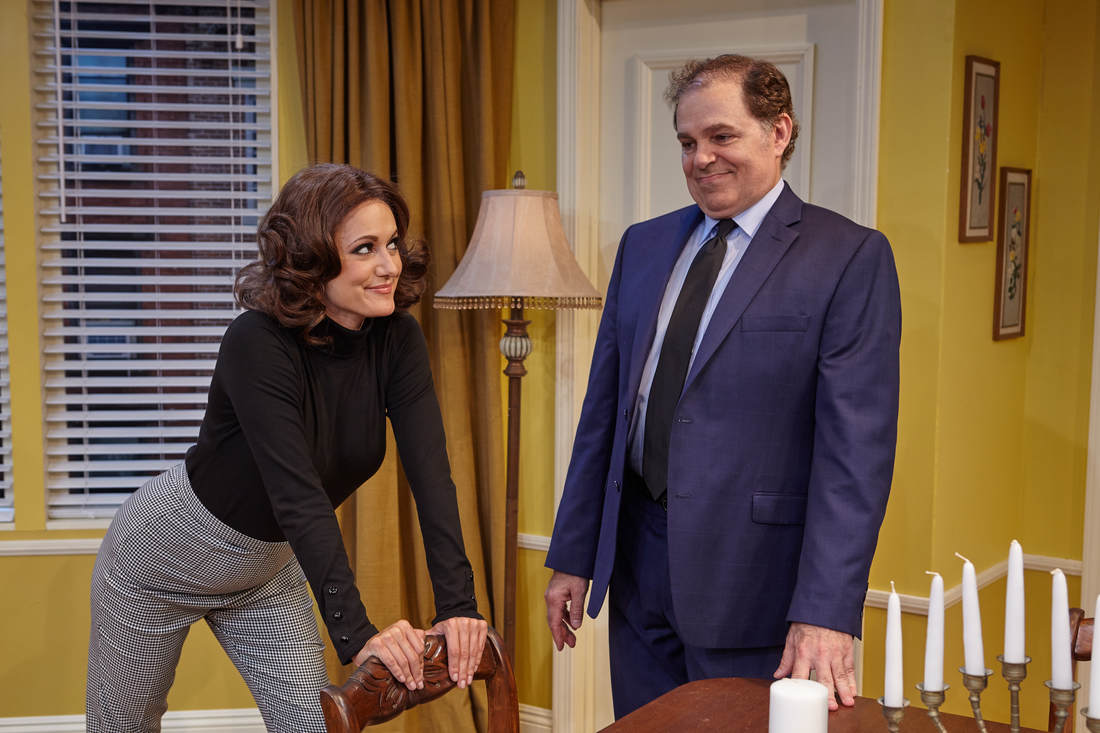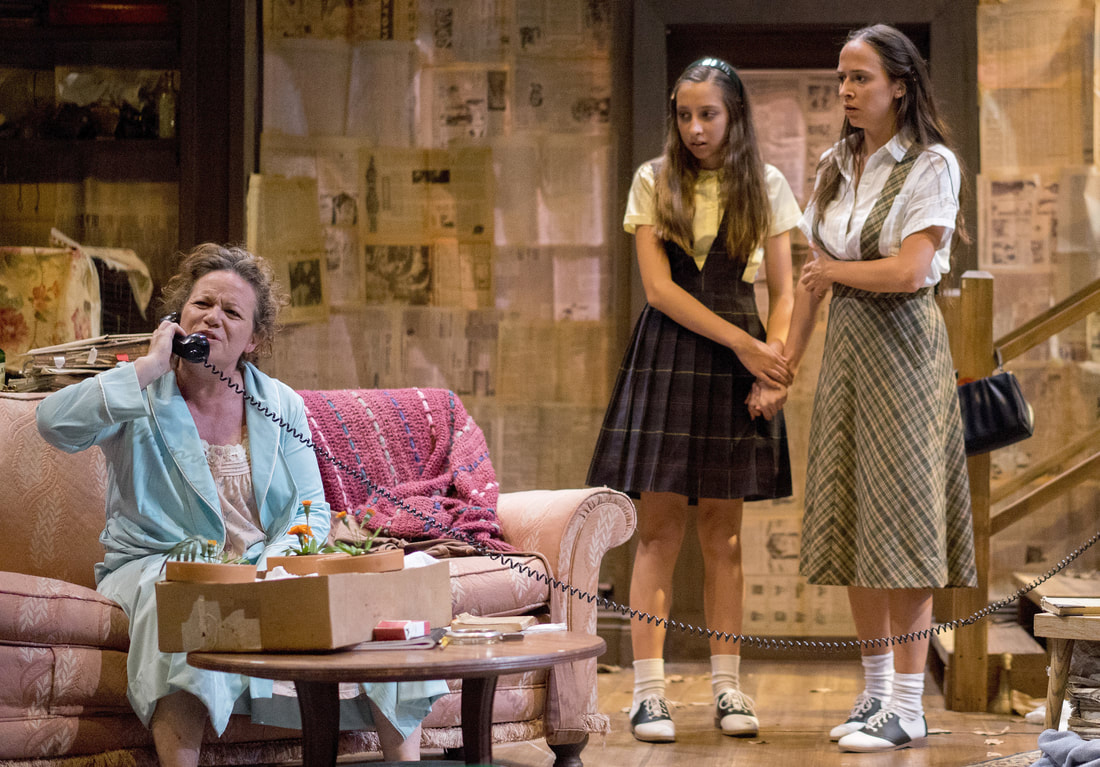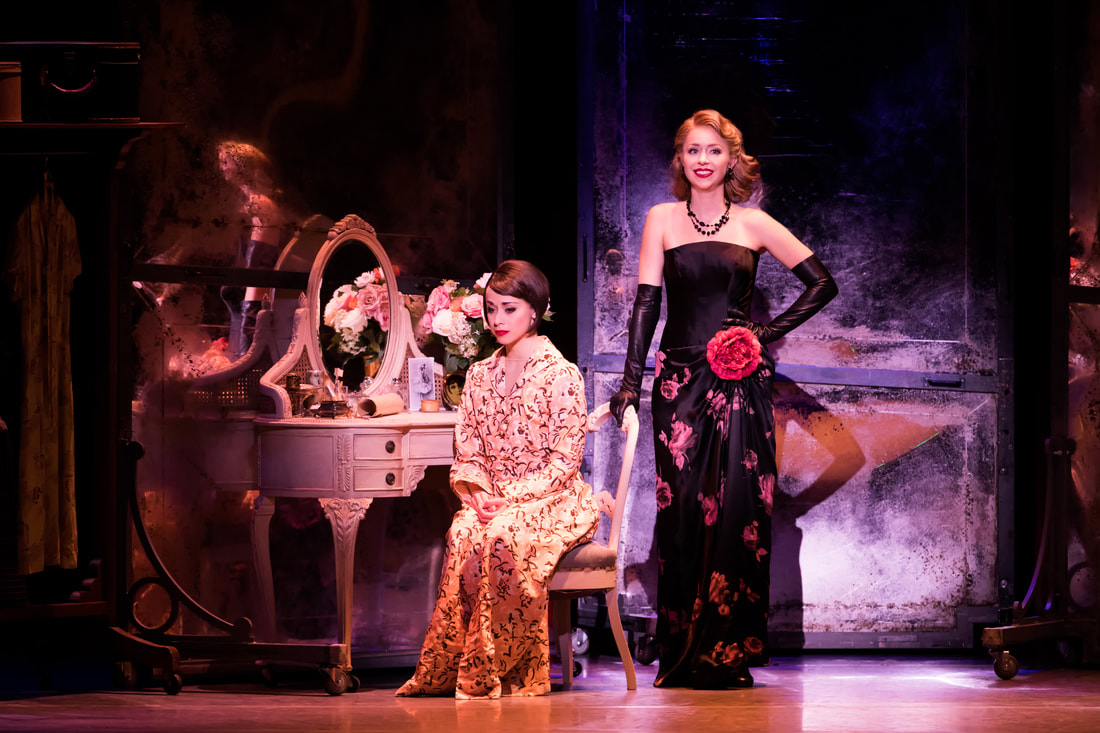|
Jeffrey Scott Parsons (left) and Richard Bermudez in "Kiss of the Spider Woman." Photo courtesy of Welk Resorts Theatre Argentinian novelist Manuel Puig probably had no idea what would spring from the publication, in 1976, of his largely stream-of-consciousness novel “”El Beso de la Mujer Arana,” or “Kiss of the Spider Woman.” Seven years later, the book would become a stage play, and two years after that a critically acclaimed film starring William Hurt and Raul Julia. But that wouldn’t be all. In 1993, “Kiss of the Spider Woman” was adapted into a Broadway musical, with a book by Terrence McNally and songs and lyrics by John Kander and Fred Ebb, the duo that gave the theater world Cabaret and, later, Chicago. The visceral and frank story of two men in a Latin American prison who are drawn to each other amid the torture and misery is now onstage at the Welk Resort Theatre, of all places, which is reminding its audiences that the material is “PC-17.” Having presented Cabaret at its darkest, which is how it was meant to be presented, a couple of years ago, staging Kiss of the Spider Woman is not as dramatic a leap for the Welk as you might think. Producer Joshua Carr deserves credit for the choice, as does Ray Limon for directing a production that is a little bloated but highly emotional and certainly gripping.
The Welk production of Kiss of the Spider Woman benefits from potent performances from its three leads. Jeffrey Scott Parsons is heart-rending as the gay prisoner Molina, who the guards love to humiliate. As the political prisoner Valentin, who becomes Molina’s roommate and more, Richard Bermudez shares with audiences a powerfully beautiful singing voice. As Aurora, the film star of Molina’s fantasies and also the titular Spider Woman, Natalie Nucci does what she does best: dazzle with her dancing. Some of those charged dance numbers feel right out of the Copacabana, clashing with the grim tone of McNally’s story, and the show’s title tune that Nucci renders sounds like a Bond-film theme song. But the agonized and often tender ballads in the score, which represent the softest moments of this occasionally brutal narrative, provide avenues for really caring about the fate of not only Molina and Valentin, but of anyone persecuted for what they believe in or who they are. (Review originally published in San Diego CityBeat on 9/27/17.)
0 Comments
Left to right: Cecilia Harchegani, Dallas McLaughlin and Wendy Waddell in "American Hero." Photo by Daren Scott There’s nothing like listing “sandwich artist” to burnish one’s resume, right? But for Sheri, Ted and Jamie, three worker bees at an in-mall sandwich shop in Somewhere, U.S.A., it’s not about resumes – it’s about living paycheck to paycheck while retaining if they can at least a slice of dignity. When it looks like the sandwich shop won’t be able to, through no fault of Sheri, Ted and Jamie’s, cut the mustard, Bess Wohl’s comedy “American Hero” turns existential. Its principals’ internal questions beckon: Why must awkward teen Sheri toil in not just one dehumanizing fast-food joint, but two? (She also works at a taco shop in the same mall.) How could middle-aged Ted, a casualty of corporate downsizing at Bank of America and a possessor of an MBA, be reduced to slapping two pieces of bread together? What did Jamie do to deserve having to wear a ridiculous vest and visor just to keep from losing custody of her kids?
But the truth is, “American Hero” is existential lite. Its plastic-gloved, assembly line trio may be mired in cringe-worthy circumstances ripe for pathos, but Wohl’s 2013 one-act is played largely for laughs. This is the case at New Village Arts Theatre in Carlsbad, Director Kristianne Kurner and a game ensemble of four (Cecillia Harchegani, Dallas McLaughlin, Wendy Waddell and Kamel Haddad) emphasize the play’s physical and visual comedy, which are its definite strengths. The script’s narrative dead spots stem from its taxed flirtations with sobriety. While playwright Wohl may have intended otherwise, Chaplin-esque commentary on the dehumanization of the American worker (think “Modern Times”) this is not. That distinction aside, “American Hero” is frequently funny during its 90 minutes. Inhabiting the story’s most outlandish character, Waddell as Jamie brassily lets insults and profanities fly with equal ferocity and velocity. Often in their line of fire is Ted, whom McLaughlin makes the most officious but also the most sympathetic of the hapless sandwich artists. (In their task-defined roles, he’s the “finisher,” Jamie is the “wrapper,” and Sheri is the “baser.”) As for Sheri, Harchegani turns in a promising debut at New Village Arts in a low-key part that in lesser hands could be totally upstaged by the two broader characters behind the sandwich counter. Another newcomer to New Village Arts productions, Haddad rounds out the ensemble, playing four way over-the-top roles, including a costume-wearing talking sandwich – that’s not a misprint. The ambient touches at New Village contribute to the fun – or to the surrealism of the play, depending on your perspective. Kristen Flores’ sandwich-shop set boasts the requisite enforced sterility and cheerfulness of such places in its bright colors and serviceable furniture. Signage including “Life, Liberty and the Pursuit of Sandwiches” speaks to the clueless franchise approach to “humor” and relatability. The transition music between scenes or in significant moments leans heavily on classic rock, though there are snippets that smack of retro lounge records, and, of all things, there’s “The Girl from Ipanema.” A little samba with your sandwich, sir? (Review originally published 9/25/17 in the San Diego Union-Tribune.) Jacque Wilke in "Ironbound." Photo by Daren Scott At one point amid the crushing drama and disappointment of Polish immigrant Darja’s life in a New Jersey at its seediest, she confides: “I’m not someone who wonders why.” She’s not someone who gives up or gives in, either, which makes the central character of Martyna Majok’s one-act “Ironbound” such an indomitable figure in the face of life’s misfortunes. But as intuitively played by Jacque Wilke in Moxie Theatre’s production, Darja is also a vulnerable woman, hiding behind her pride and her grit, but more alone inside than she wants to admit.
“Ironbound” is the opening show of Moxie’s 13th season, its first with Jennifer Eve Thorn as executive artistic director (succeeding Delicia Turner Sonnenberg). Thorn, along with Turner Sonnenberg among Moxie’s original co-founders, selected “Ironbound” to kick off the company’s new season. She also directs its earnest cast that includes Eric Casalini as Darja’s housemate and wayward lover, Tommy, a postal worker; Arusi Santi, who appears in flashback scenes as her Polish first husband Maks, who dreams of playing the blues in Chicago; and Carter Piggee as a teenage hustler whom Darja meets in another, harrowing flashback. The one constant in the play’s shifts in time – 22 years between 1992 and 2014 – is a desolate bus stop in Elizabeth, N.J., designed at Moxie by Divya Murthy Kumar. Barb-wired, graffiti’d, strewn with trash bags and old tires, it’s there that 42-year-old Darja waits and waits – for a bus that never seems to come, for a happiness in her adopted country that seems ever out of her reach. Whether working in a miserable factory job or cleaning houses for the rich, Darja does what she can to survive, and along the way in this reflective piece, the sheer will and energy required for that survival costs her two marriages (one of them abusive), and, she fears, a troubled son whose whereabouts are in question. Yet the resiliency of Majok’s heroine – again, endearingly portrayed by Wilke – is as persistent as Darja’s Polish accent and her hold on her self-respect. She also has a biting sense of humor and, in one of “Ironbound’s” welcome comedic left turns, a clever ingenuity when it comes to catching Tommy at his cheating (with the woman whose home she cleans, of all people) and with meting out her little brand of justice. (The latter puts an end to that particular cleaning job.) Majok’s good-hearted cad Tommy is a familiar type, and his sentimental evocation of Bruce Springsteen practically a Jersey trope. The harmonica-playing Maks, whose English is just as broken but determined as Darja’s, is a more inspired character, though the two men are equally adamant about Darja abandoning the malaise and the inertia of the bus stop. The piquancy with which this all plays out is the heartbeat of “Ironbound,” and make no mistake: It’s Darja’s stalwart heart that’s beating as the story unfolds, its present and past intertwining. Besides being a thoughtful character study, “Ironbound” is a reminder of the struggles of the immigrant experience, and of the dignity that those who brave it can achieve. (Review originally published 9/25/17 in the San Diego Union-Tribune.) Steven Lone and Carla Harting in "Roz and Ray." Photo courtesy of San Diego Repertory Theatre Beneath all the medical jargon and the repeated indictment flogging of the system that forces doctors into untenable positions and feeds a greedy pharmaceuticals community, Karen Hartman’s Roz & Ray is a sensitive love story. Roz (Carla Harting) is a committed doctor specializing in treating hemophiliac children, Ray (Steven Lone) the divorced father of two such children. In a story that stretches from 1978 to the early ‘90s, they are brought together in Hartman’s play initially via their doctor/patient relationship, but another, more intimate relationship begins to form between Roz and Ray. The whole thing’s further complicated by a terrible blood-contamination crisis brought on by the AIDS epidemic. This tense and thoughtful play, directed by Delicia Turner Sonnenberg, starts off very slow and talky, but gains emotional momentum as its circumstances, based on true events, tragically unfold. (Review originally published in San Diego CityBeat on 9/20/17.)
Hannah Ellis and Bryce Pinkham in "Benny & Joon." Photograph by Jim Cox “Benny and Joon,” the 1993 cult film, was quirky and sweet. Benny & Joon, the world-premiere musical at the Old Globe Theatre directed by Jack Cummings III, is quirky and sweet. So it follows: If you liked the movie, the star of which was neither Benny (Aidan Quinn) nor Joon (Mary Stuart Masterson) but Johnny Depp as the quirky Sam, you’ll like the musical (written by Kirsten Guenther, Nolan Gasser and Mindi Dickstein), which is completed heisted by Bryce Pinkham as the quirky Sam.
Though the narrative of the film and this show on which it’s based address serious underlying issues – schizophrenia, grief, fear of love, to name the most salient -- the story of siblings Benny and Joon, and Sam, the stranger who changes their lives, thrives on charm and even cuteness. In addition to Pinkham (A Gentleman’s Guide to Love and Murder on Broadway), who has a magnetic Chaplainesque quality ideally suited to the role of Sam, Andrew Samonsky and Hannah Elless are sympathetic and more than up to the demands of the show’s modest but melodic score. The upshot is a musical fairytale with a few dark corners on the road to happily ever after. (Review originally published in San Diego CityBeat on 9/20/17.) William Cooper Howell (center) in "In the Heights." Photo courtesy of Moonlight Stage Productions Tick … tick … tick …
That tick-tock you hear is the slow but steady countdown to the arrival of “Hamilton” in San Diego. The highly anticipated opening is Jan. 6 at the Civic Theatre downtown. But for now, let’s give some love to Moonlight Stage Productions in Vista, where right now, and until Sept. 30, you can catch a thrilling staging of the urban musical “In the Heights.” What does this have to do with “Hamilton”? The music and lyrics of both shows were written by the mega-talented Lin-Manuel Miranda, maybe the hottest name in theater today. “Hamilton” struck a chord with America, but when it opened on Broadway nine years ago, “In the Heights” (with a book by Quiara Alegria Hudes) didn’t fare too badly itself: the kinetic musical that mingles salsa-meringue with hip-hop, would win four Tony Awards including Best Musical, and later won a Grammy. With reason. This is a truly infectious show, and not just the music. You get quickly wrapped up in its characters – those who live and work in the Washington Heights neighborhood of NYC – a spirited lot with passion for life and for each other, faith in the face of adversity, and a joyousness about music, dancing and romancing. The San Diego Rep staged a memorable production of “In the Heights” in 2013, and Moonlight’s, directed by James Vasquez with choreography of Carlos Mendoza, is even better. Props, too, to a robust and versatile orchestra directed by Elan McMahan. “In the Heights’” players on stage are many, but very worthy of note are William Cooper Howell as Usnavi, the story’s anchor character and resident dreamer; Marlene Montes as the sassy but indomitable unisex salon owner Daniela; and Michelle Cabinian as Vanessa, the woman of one of Usnavi’s fondest dreams. “In the Heights” has more than spirit – it has heart. It also should tide you over if you’re fortunate to have tickets for “Hamilton.” Yunjin Kim and James Kyson in "Wild Goose Dreams." Photo by Jim Carmody For a one-act play, even a long-winded one-act play, La Jolla Playhouse’s Wild Goose Dreams is stuffed with enough commentary and would-be cleverness for two acts. Maybe three. Playwright Hansol Jung’s overly ambitious script spins on its shaky axis between a political drama about the divided Korean Peninsula and an uneasy love story nearly swallowed up by the omnipresence of the internet. The latter is personified onstage by an ensemble of young actors voicing the peculiar but well-worn language of emojis, text-speak and pop-ups. It’s a stagey, labored device that quickly loses its novelty.
In this world-premiere production directed by Leigh Silverman, the focal characters are Minsung, a “goose father” in Seoul (James Kyson) who has sent his family to the U.S. where his daughter can be educated, and Nanhee (Yunjin Kim), a North Korean who has defected to the South. Mutual loneliness brings them together via the web, beginning a relationship that is troubled by his separation from his child and her separation from her father (Francis Jue) in the North. Clear enough. But Wild Goose Dreams sinks under the weight of its allusions to mythology and metaphor, and straining as it does for both laughter and tears, it’s tonally all over the map. Kyson and Kim are engaging enough (and Jue even more so), but that walking, talking, beeping, singing “internet” is just begging to be shut down. (Review originally published in San Diego CityBeat on 9/13/17.) Katie Karel and Phil Johnson in "Last of the Red Hot Lovers." Photo by Aaron Rumley Neil Simon’s 1969 Last of the Red Hot Lovers possesses more depth than an old episode of “Love American Style,” but it’s just as silly in its infatuation with the “with-it” topics of the time like the sexual revolution and smoking pot. Not that this affable comedy about a restaurateur’s middle-aged gotta-get-laid crisis isn’t funny. It can’t not be with the exasperated Phil Johnson starring as the beleaguered Barney Cashman. And North Coast Rep’s production, directed by Christopher Williams, co-stars three delightful – and highly entertaining– actresses as Barney’s very different but equally elusive “conquests”: Katie Karel, Noelle Marion and Sandy Campbell. (Review originally published in San Diego CityBeat on 9/13/17.)
Left to right: Deanna Driscoll, Abby Depuy and Rachel Esther Tate in "The Effect of Gamma Rays on Man-in-the-Moon Marigolds." Photo by Daren Scott You’ve got to feel for Tillie Hunsdorfer, the teenaged science prodigy in Paul Zindel’s The Effect of Gamma Rays on Man-in-the-Moon Marigolds. Her mother Beatrice is severely depressed, bitter and remorselessly mean. Her sister Ruth is afflicted with both physical and emotional problems. The household boarder is a frail old woman who moves via walker and never speaks. That Tillie, a gentle and dreamy presence, does more than merely survive this misery is the salvation of this despairing and often brutal story.
Cygnet Theatre’s production of Zindel’s play – it failed on Broadway but won the 1971 Pulitzer Prize and became a well-respected film a year later – spares none of the script’s harsh realities or cruelties. Gamma Rays … is not escapist entertainment. But director Rob Lutfy sensitively directs a stalwart cast. Deanna Driscoll commits heart and soul to the deep-seated complexities of Beatrice, who is at once narcissistic and self-loathing, a person painfully starving for love but unable to give it. Driscoll’s unselfconscious performance is also a brave one. Though the daughters are narrative satellites of the Beatrice character, both Rachel Esther Tate as Ruth and Abby Depuy as Tillie distinguish themselves fearlessly as well, with Tate’s harrowing mania as the older daughter making for some of the evening’s most unsettling moments. The play’s memorably unwieldy title refers to Tillie’s science project: exposing marigolds to radioactivity and assessing the results. For Tillie, the experience is one of otherworldly wonder, and given her family she needs another world. Her profound relationship to her project is emphasized in recurrent sequences that are softly and thoughtfully choreographed. Gamma Rays … plays out on an appropriately messy set by Charles Murdock Lucas (with properties designed by Rachel Hengst) that evokes both the grim truths and prevailing hopelessness of the Hunsdorfer household. Their domain is not one you’d wish to visit in real life, and you hope that the real-life Tillies out there who do occupy them find their freedom and their joy someday. (Review originally published in San Diego CityBeat on 9/6/17.) Sara Esty (left) and Emily Ferranti in "An American in Paris." Photo by Matthew Murphy Like the film that inspired it, An American in Paris the musical is a spectacle of balletic dance. Period. Its love quadrangle is far less interesting than the often-stunning choreography (by Christopher Wheeldon, who also directed) set to the music of George and Ira Gershwin. The touring production of An American in Paris opened Tuesday night at the Civic Theatre, presented by Broadway San Diego. It’s a lengthy but lush affair that will most enchant lovers of dance (and maybe lovers of Paris, which is sincerely evoked in both the production’s inventive set pieces and color-changing screen projections).
Most lovable of all is Sara Esty as the fledgling ballerina Lise, who, if you don’t know the story already, captivates the attention of an artist (McGee Maddox) and a pianist (Stephen Brower) while at the same time being promised in marriage to a Frenchman (Nick Spangler). The petite, graceful and supremely athletic Esty is a joy to watch in all of this show’s ballet sequences, and especially in the marathon piece that precedes the story’s inevitable denouement. An American in Paris continues through Sunday, Sept. 10. |
AuthorDavid L. Coddon is a Southern California theater critic. Archives
July 2024
Categories |
David Coddon |
|
